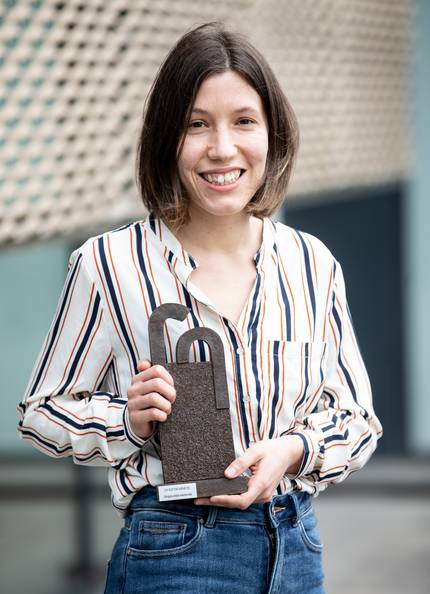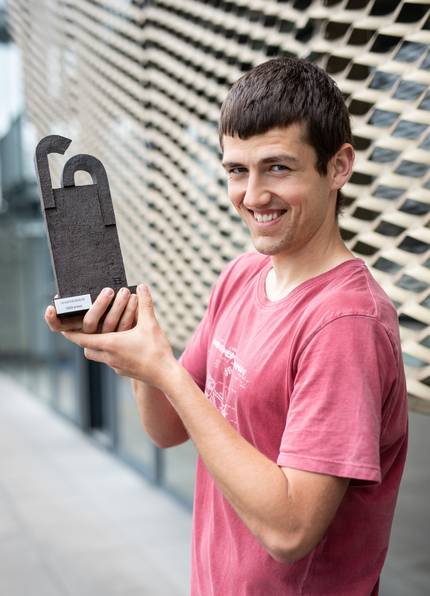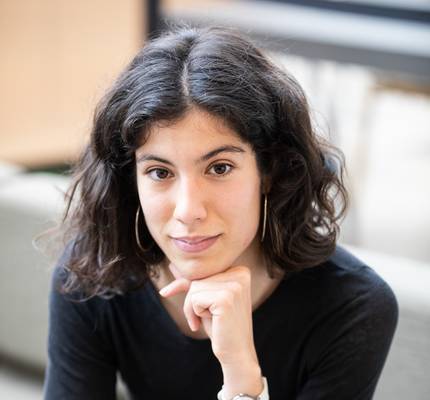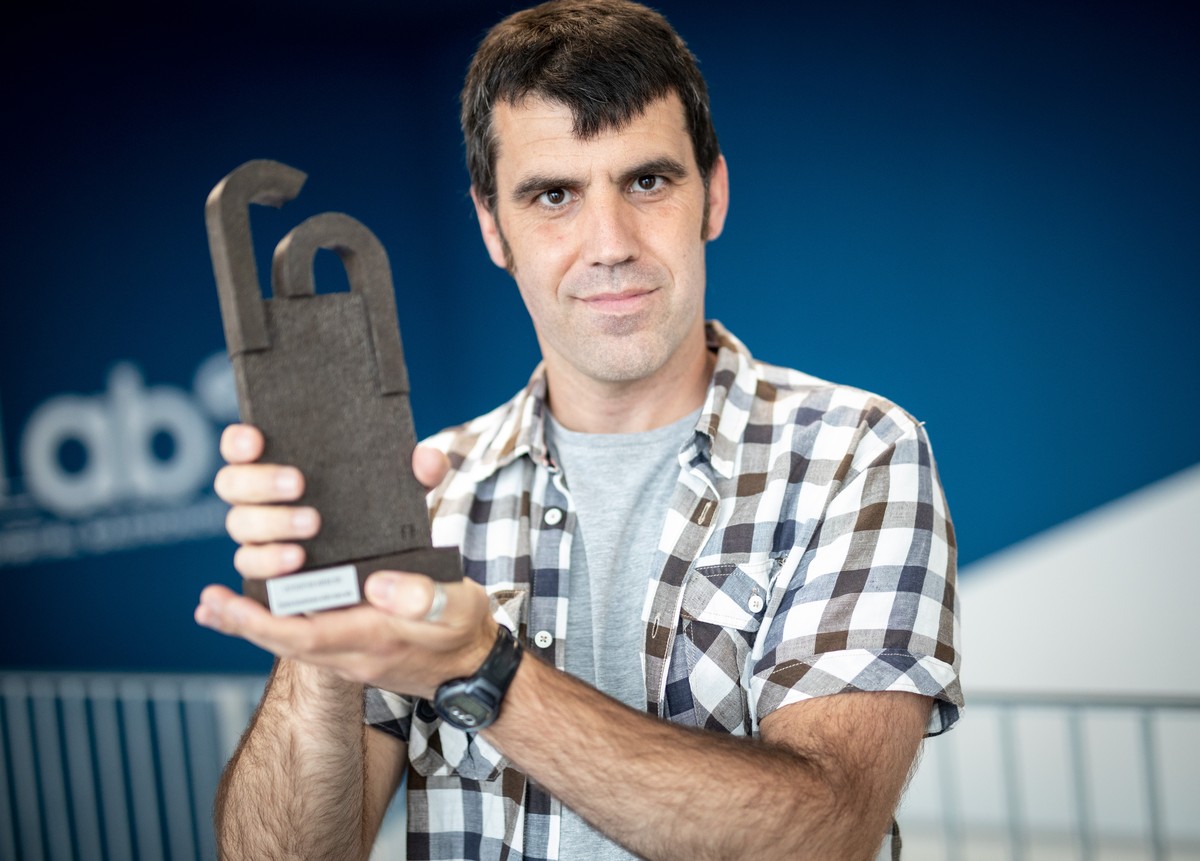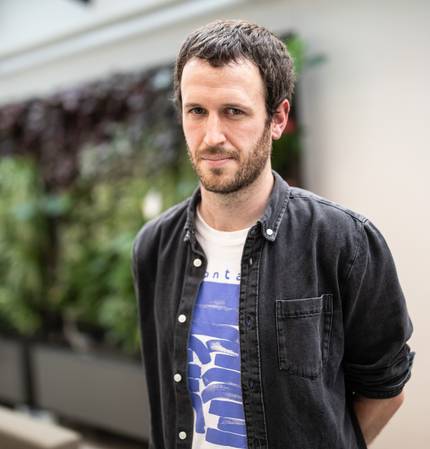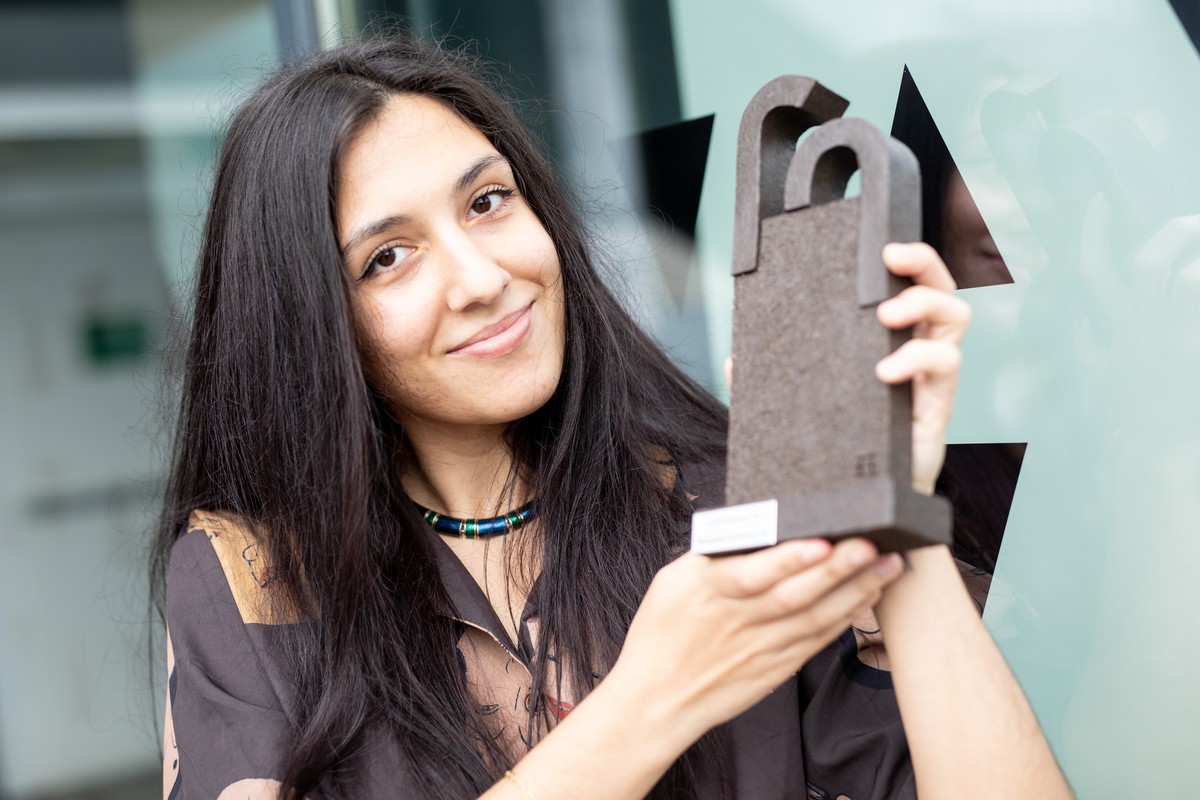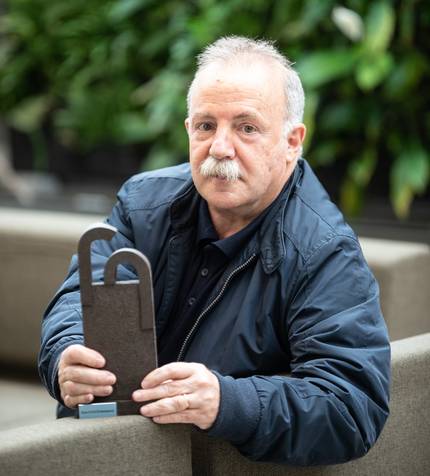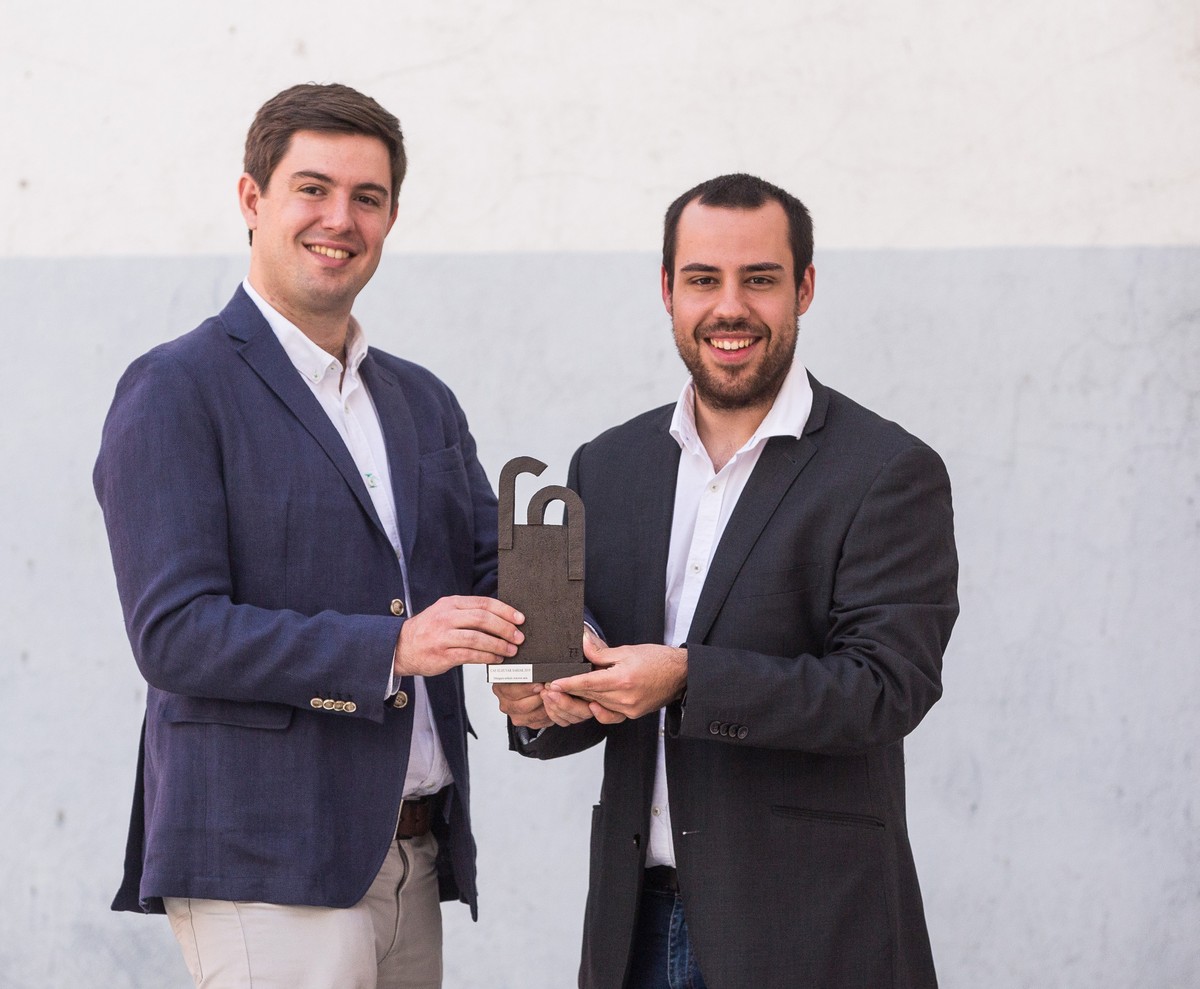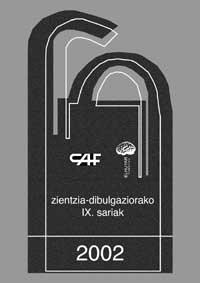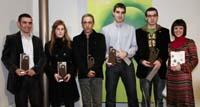CAF-Elhuyar Awards 2021: knowledge is the vaccine
2021/04/28 Agirre Ruiz de Arkaute, Aitziber - Elhuyar Zientzia Iturria: Elhuyar aldizkaria

The CAF-Elhuyar awards were presented yesterday under the slogan “Jakintza da txertoa” at the Kutxa Cultural Square in Tabakalera in Donostia. More awards have been distributed this year than ever. The winning entries were:
“We try to lock nature in vain,” by Nahia Seijas Garzón. Award for the general informative article.
“Development of sustainable polymers for food packaging”, by Ainara Sangroniz Agudo. Award for a dissemination article based on doctoral thesis.
“Betizua, the last European wild cow to extinguish?”, by Asier Albite Arregi. Special Neiker Award for the best work in the primary sector.
“Climate change and viticulture”, by Helene Sánchez Zelaia. Special mention of the Neiker Prize.
“Las ventanas de casa observatorio de la naturaleza”, by Iñaki Sanz-Azkue, published in the weekly Gaur8 and in the digital newspaper Naiz. Scientific journalism award.
“Think, don’t believe,” Jon Urzelai Urbieta. Special mention of scientific journalism.
“Sonata 00001011-Spam Sound Imaging Concert” by Itxaso Navarro Celestino. Creation scholarship.
“A city of 15 minutes, a territory of 45 minutes. Contemporary Basque cartography”, Ander Gortazar Balerdi and Jacek Markusiewiczen. Creation scholarship.
Dr. Jabier Agirre Lasarte. Elhuyar Award of Merits.
In vain we try to enclose nature
Amurriarra Nahia Seijas Garzón has been the winner of the General Disclosure Article Award, with the article titled “Uselessly we try to fill nature.” According to the jury, Saijas recounts the history of history in a pleasant and attractive way, and from the journalistic point of view, underlines that the thread of the article is well sewn.
Seijas, awarded the prize, has now described as a human right the possibility of understanding, following, participating in scientific advances, ultimately enjoying scientific culture. And it has also focused on education: “Biology and geology occur in schools in a very abstract way. Many times we forget the historical part of biology and geology and show up without that context or historical interpretation. That has been my motivation to write the article; I wanted to place the natural sciences in space and time.”
Developing sustainable polymers for food packaging
Ainara Sangroniz Agudo has been the winner of the award for the article based on the doctoral thesis thanks to her work “Development of sustainable polymers for food packaging”. Sangroniz is from Elgeta. In the opinion of the jury, this is an investigation that responds to a current problem, highlighting the current and objective of the author: improve the world. His thesis director has received the award, as Sangroniz is in the USA.
About to disappear the last wild cow in Europe?
The Special Neiker Prize aims to reward the works of the primary sector and this year’s winner has been the Zumaiarra Asier Albite Arregi, thanks to the work “Betizua, the last European wild cow in extinction?”. The members of the jury in this category especially value the innovative, technological and useful nature of the work.
By collecting the prize, Albite has taken advantage to make a defense of a endangered betizu. Not only that, but also the farmhouses and the families of baserritarras that inhabit them, that make extensive livestock and agriculture and maintain natural biodiversity, are about to disappear. “They are also the repository of the cultural heritage of our ancestors,” he said with concern.
This year the jury wanted to highlight with a special mention a second work of the previous sector. This time, Helene Sánchez Zelaia has been awarded the work “Climate change and viticulture”. According to the jury, in this article the author gives a solution to a current problem based on interdisciplinarity and practicality.
The windows of the house look at nature
The prize in the field of scientific journalism has been awarded by a full current article that offers a personal vision of the author, based on observation and contemplation, which brings originality. The work entitled “The windows of the house are the observatory of nature”, written by Hernaniarra Iñaki Sanz Azkue, was published in the weekly Gaur8 and in the digital newspaper Naiz last March.
“I wrote the article when we were all confined and looking out the window in the middle of the pandemic,” Sanz recalls. The pandemic has brought many topics of reflection, among which is the essential scientific dissemination. This link between science and society has become an indispensable variable. In order for the conclusions of scientific articles to be understood by society, we need clear and direct messages to be made in Basque.” It indicates that we should also reflect on biodiversity: “For future pandemics, biodiversity will be the main wall. We should introduce biodiversity into this society in serious words.”
On the other hand, although only one work can be awarded in the matter, the jury has decided that another work deserves a special mention: Jon Urzelai Urbieta, from Zumarraga, “Think, don’t believe.” The jury notes that the work done in the radio program KKinZona of the communicative project of Urretxu and Zumarraga illustrates the concepts of the pest, clarifying many beliefs. “I wanted to respond to the social environment I perceived in my environment,” said Urzelai. I see around me a social tendency to look with distrust at science, which he accuses of many evils, and which he argues has responded to a concrete economic logic. All this thinking that they are being transgressors and with a possible critical vision in the mouth. We live in a complex situation where society faces complex challenges. To do this, we must look critically at science, leaving aside technological utopism and science, but not forgetting that the critical approach needs science.”
Supporting projects that bridge science and society
In addition to the awards, the CAF-Elhuyar competition grants a grant of 5,000 euros to promote projects that serve as a bridge between science and society. This year, however, two grants of this type have been distributed, one by the Donostian Itxaso Navarro Celestino for the “Sonata Image Transductions Concert 00001011-Spam”. The jury stressed that Navarro proposes a new technique and makes an interesting reflection, bringing spam to another language.
“This project began four years ago thanks to Elhuyar, thanks to the award received by the Miraila project. In that project we reviewed our ancestors, painting works they left in the caves. And while we were in it, I realized that in the future we will be asked to know how we were. And that the surpluses we generate will be those who see us, especially digital trash, spam. All this information that we publish daily on social networks will be known in the future. So my proposal is to turn those surpluses into music to show how they will listen to us in the future.”
The second grant was received by Polish Ander Gortazar Balerdidonostiarreta Jacek Markusiewicz, “a city of 15 minutes, a territory of 45 minutes. Contemporary Basque cartography”. The jury has stated that the work highlights a contemporary concern related to urbanism and that it can be useful for social reflection. Being outside Euskal Herria they have not been able to collect the prize directly.
Jabier Agirre Lasarte
The board of trustees of the Elhuyar Foundation has awarded the Elhuyar Award to the doctor Jabier Agirre Lasarte, in recognition of his long career in the normalization of Basque and in the dissemination of science and technology.
“Basque and medicine have been Agirre’s two passions to become a great disseminator,” said Txema Pitarke de la Torre, director general of nanoGUNE and president of the Elhuyar Foundation. “He has worked on radio, television and paper press. Elhuyar magazine, for example, has been writing medical articles every month for 21 years, with a total of 219 articles.” Agirre, for his part, thanked those in his home, excited.
Jury
As for the jury, outreach articles and journalism work have been judged by: Arturo Elosegi Irurtia, ecologist and researcher at UPV; Marian Iriarte Ormazabal, chemist and researcher at UPV; Alberto Barandiaran Amillano, journalist and writer; and Aitziber Agirre Ruiz de Arkaute, director of Elhuyar magazine. The winners of the Neiker special prize have been: Arantza Madariaga Aberasturi, Director of the Elika Foundation; Pilar Santamaría Martínez, Area Manager of the HAZI Foundation; and Rikardo Bueno Zabalo, Director of BRTA.
The projects presented to the creation scholarship in Science Society have been judged by: Lorea Agirre Dorronsoro, director of the Jakin Foundation; Koldo Almandoz de La Cruz, film director; Josu Rekalde Izagirre, professor of Art and Technology at the UPV; and Irune Bengoetxea Lanberri, head of communication at Elhuyar.

Gai honi buruzko eduki gehiago
Elhuyarrek garatutako teknologia




